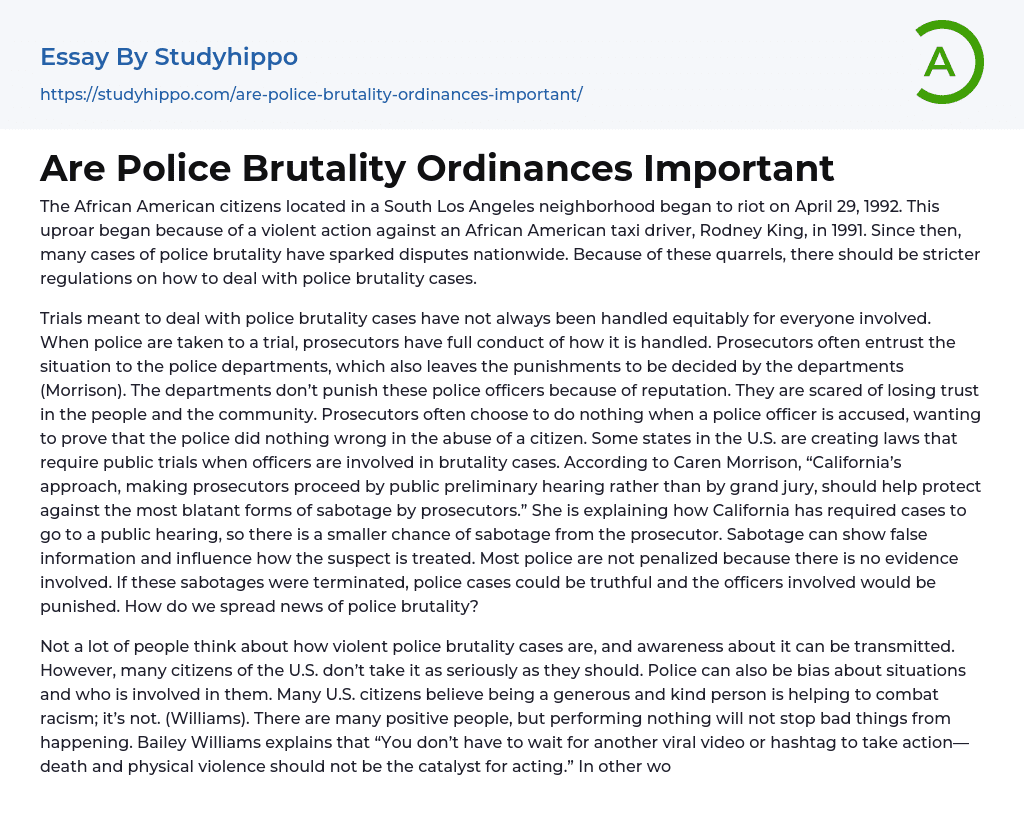The riot in South Los Angeles on April 29, 1992 was instigated by African American residents, sparked by the severe mistreatment of Rodney King, an African American taxi driver, in 1991. As a result, incidents of police brutality have led to clashes throughout the country.
It is essential to enforce stricter regulations for instances of police brutality in light of the ongoing disputes. Unfortunately, there has been inconsistent and unfair treatment of these cases. Typically, prosecutors are responsible for overseeing these trials but often pass on this responsibility to the police departments. As a result, the departments also determine the punishments for such incidents (Morrison). However, they frequently avoid penalizing the implicated officers due to worries about damaging their reputation. There is apprehension about losing trust from both the public and the community.
Prosecutors often choose
...not to take action when a police officer is accused, in order to show that the police have not acted improperly towards a citizen. However, some states in the United States are passing laws that require public trials for cases involving officer brutality. In California, for example, prosecutors are mandated to hold public preliminary hearings instead of grand jury proceedings, which prevents intentional interference by prosecutors. This requirement reduces the chances of false information being presented and influencing how the suspect is treated. As a result, many police officers go unpunished due to lack of sufficient evidence.
If we put an end to these acts of sabotage, it will result in honest police investigations and the responsible officers being held responsible. The problem lies in how we can increase awareness regarding incidents of police brutality. Numerous individuals lack a complete understanding of
the extent of violence associated with such cases, hence it is crucial to spread this information. Regrettably, a significant portion of US citizens fail to recognize the gravity of this issue.
Williams argues that police officers can demonstrate bias when evaluating situations and individuals. A common misconception among Americans is believing that acts of generosity and kindness alone can effectively combat racism.
According to Bailey Williams, there is no need to rely on viral videos or hashtags in order to take action against police brutality. It is important to recognize that action should not only be prompted by death and physical violence. You have the ability to act immediately against police brutality, and there are multiple approaches to raise awareness about this problem. An impactful event took place in Georgia in 2010 involving Caroline Small, an African American mother who was shot eight times after a slow chase.
The police expressed their fear of being struck by her car, although Small posed no immediate threat and had not engaged in any criminal activities (Morrison). The shooting was deemed justified following a thorough discussion by the police. Numerous incidents have incited riots and uprisings, contributing to the awareness surrounding police brutality. While some argue for the punishment of law enforcement officers who mistreat innocent individuals, there are dissenting opinions on this matter.
They assert that police officers have the option to attend court and should not need to communicate regarding the cases. However, police officers are fellow citizens of the United States and must be obliged to appear in court. Caren Morrison reveals that prosecutors have the discretion to handle police cases when they are assigned.
The lack of accountability for
police officers often results in a lack of consequences, allowing them to maintain control over citizens and continue engaging in abusive behavior. Implementing stricter measures for disciplining officers could potentially reduce the frequency of such incidents. However, prosecutors frequently disregard existing regulations and laws pertaining to cases of police brutality. It is common for law enforcement to exhibit laziness and resort to violent tactics when handling various situations.
However, during trials, numerous prosecutors engage in either undermining the evidence or displaying disinterest in the proceedings. Consequently, uprisings have emerged to draw attention to the unjust nature of these trials.
- A Policeman essays
- Media Violence essays
- Domestic Violence essays
- Violence in Video Games essays
- Gun Violence essays
- Video Game Violence essays
- Violence Against Women essays
- Youth Violence essays
- Agreement essays
- Business Law essays
- Common Law essays
- Community Policing essays
- Constitution essays
- Consumer Protection essays
- Contract essays
- Contract Law essays
- Copyright Infringement essays
- Court essays
- Crime essays
- Criminal Law essays
- Employment Law essays
- Family Law essays
- Injustice essays
- Judge essays
- Jury essays
- Justice essays
- Lawsuit essays
- Lawyer essays
- Marijuana Legalization essays
- Ownership essays
- Police essays
- Property essays
- Protection essays
- Security essays
- Tort Law essays
- Treaty essays
- United States Constitution essays
- War on Drugs essays
- Affirmative Action essays
- Assisted Suicide essays
- Capital Punishment essays
- Censorship essays
- Child Labour essays
- Child Protection essays
- Civil Rights essays
- Corporal Punishment essays
- Death Penalty essays
- Empowerment essays
- Euthanasia essays
- Gay Marriage essays




